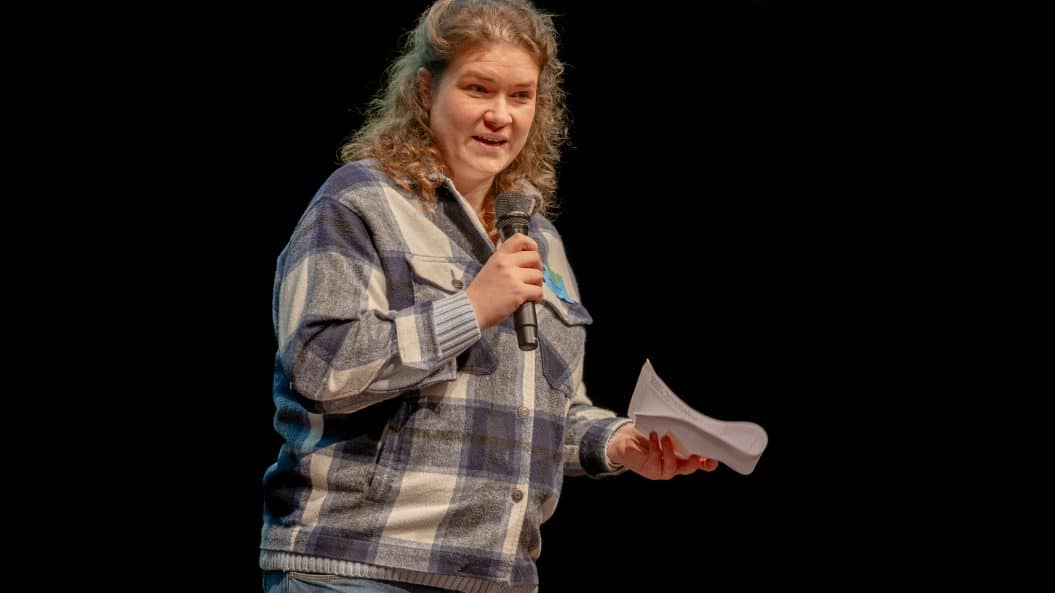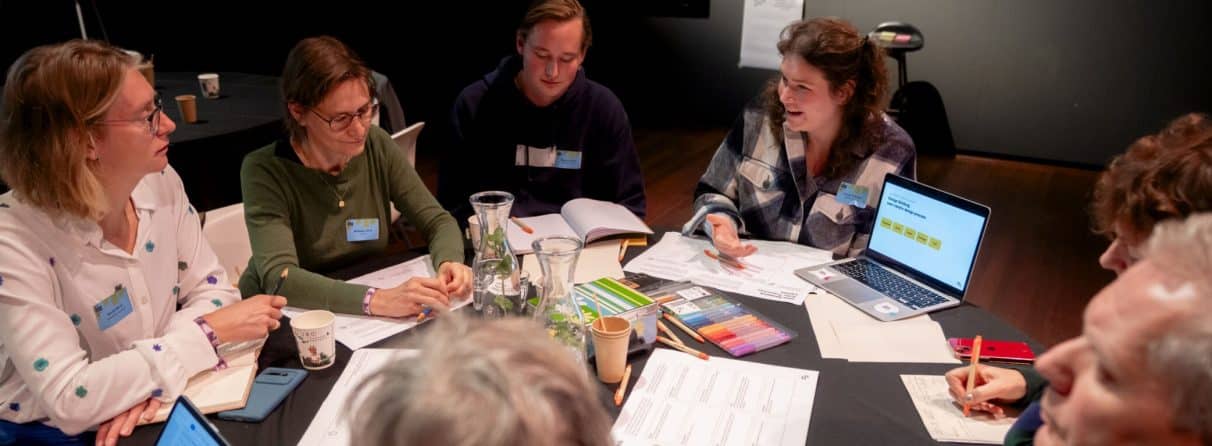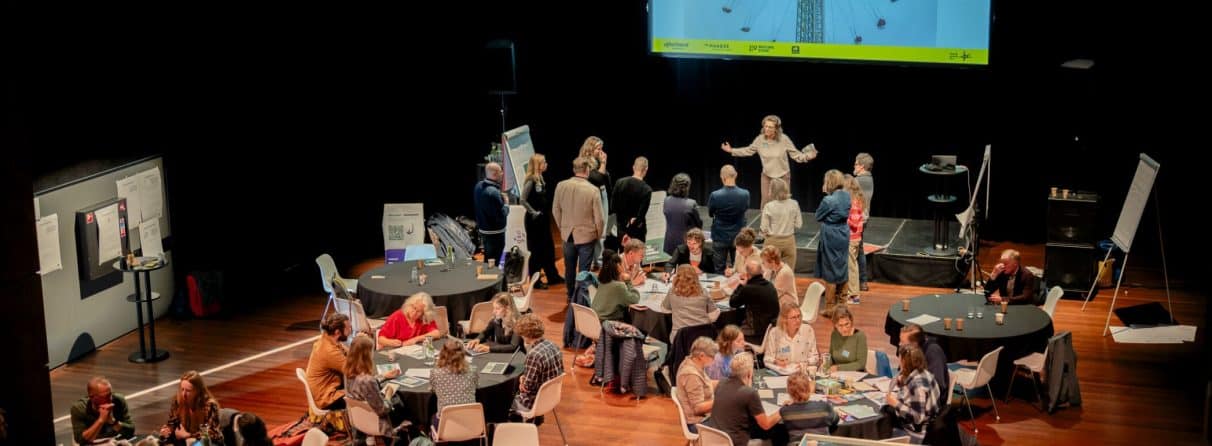Kristel Thieme is founder and director at New Future Lab and partner of ESC. She also sometimes feels like an activist: “From an increasingly better understanding of how we organize ourselves as a society, and what that means for people in all kinds of situations, I feel more and more urgency to stand up for my fellow people.”

Interview with Kristel Thieme: “I want to bring back equality in society”
Kristel Thieme, founder and director at New Future Lab, became a partner of the Expertise Network Systemic Co-Design (ESC) in 2024. She calls herself a ‘future maker’. In her approach, she draws attention to residents and users: beware, people are getting tired of research! Together with ESC, she works on knowledge development about collaboration.
How did you get to know ESC?
“I first heard about it through an entrepreneur from my network. I saw a lot of similarities with what we do.”
How do you fulfill your role as a partner?
“I went to meetings, followed a training course and participated in the ESCall. The ESCall is a call to record knowledge so that you can share it with others.”
In 2024, the expertise network made a subsidy of up to 7,500 euros per application available to entrepreneurs affiliated with ESC. The aim is to record the knowledge of entrepreneurs in a knowledge product, so that it becomes available to others and can be used in other contexts. The scheme offers partners the opportunity to make something that they would otherwise not have the opportunity to make. Eight partners have made use of it.
What knowledge do you share?
“Our knowledge about equal cooperation. We are developing an instrument that challenges parties to shape relationships more consciously. We have summarized the complexity of relationships in six components. One of those components is ‘the direct added value for participants in the process’. Researchers and policymakers often set a goal for the distant future. In our approach, we add: how do you ensure that you create value here and now, for the people who provide you with crucial input to shape the future? If you don’t pay attention to that, no one will want to think along with you. People are getting tired of research.”
Why this prominent attention to residents and users and to ‘here and now’?
“We live in a society where people drop out. For example, people attend a participation meeting about a plan in their neighbourhood, but may leave feeling that their input does not matter. The problems they now experience are often dismissed as irrelevant. The researcher wants to talk about the future, but people live here and now. What doesn’t help is that there is rarely good feedback on what happens with their input. As a result, people do not feel heard or appreciated. What I want is for a resident to leave after a meeting with a smile and say: call me again next time. I want to find ways to talk to each other in a more sustainable way, not just if an organization has figured out that something new needs to be created.”
What do you get out of the expertise network?
“It is sometimes difficult to explain to the outside world what New Future Lab does. If I can find words for it and substantiate it scientifically, I can better explain why it is important. Together with the researchers at ESC, I am looking for a common language for the new body of thought that is Systemic Co-Design.”
What do you bring?
“Especially cases and knowledge about the complexity of practice. Our cases touch all target groups: policymakers, civil servants, entrepreneurs, researchers, residents, users. How do you design an equal collaboration for all those groups?”
Do you have an example?
“We are working to stimulate entrepreneurship and meeting in neighborhoods where many people live with fewer privileges. In the exploration, we focus on bringing value to residents and investing in connection. Participating instead of coming to observe. We do this, for example, by voluntarily being active as a team in a neighborhood café. There we have great conversations and learn much more about the context of the neighborhood, and what is needed, than through a survey. There is more room for connection and deep conversations, instead of just ‘quick quick’.”
What themes do you work on?
“We are very busy building entrepreneurial communities, in which people build a stronger neighborhood and city together. In addition, a statement such as ‘the resident first’ is easy to say. But what do you mean by it? What attitude is part of that? And how does ‘power’ play a role in this? Another theme is digital inclusion and accessibility: how do we create a system in which everyone can participate digitally equally? We are building practical solutions to help people practice skills, but we are also looking at which parties in the broader system can play a role in the solution.”
What motivates you?
“Society is hardening and there is an increasing distance between people. I want to connect, bring back the closeness. In today’s society, groups are excluded, they are not on the radar. We think in boxes instead of systems. For example, if someone doesn’t have digital skills, how can they participate? If we are not careful, we will have a society in which we become increasingly distant from each other.”
What does Systemic Co-Design mean to you?
“A definition is difficult to give. But in any case, it is a method with which we as a collective design a future in which everyone participates equally. ‘Systemic’ is one of the core values of New Future Lab. On a spectrum, I see systemic as the golden mean between silo thinking and an unlimited approach. With silo thinking, you approach everything as a separate issue and you miss the complexity and interaction that is needed to really make a difference. If something on the other side is unlimited, the complexity becomes infinite and you never take action. Then you just keep talking. With systemic you start from the system and form targeted coalitions. For me, co-design is also about the collective: building solutions together and recognizing and appreciating each other in this. The result should be that you come up with solutions that really work faster. No band-aids that have been devised in an ivory tower, but tangible results for and with the people involved.”
Does the Expertise Network Systemic Co-Design function well?
“The collaboration with the researchers is going well and ESC has an important facilitating role. There is an opportunity for a more lobby-like role. By this I mean putting Systemic Co-Design on the agenda of policymakers and governments. The philosophy is new and you want to include all parties in it.”
What was an important event in 2024?
“I loved the ESCuela training. During the training, I got to know the Co-Design Canvas method better and it surprised me how much common ground there is with New Future Lab’s approach. It was also fantastic to meet other people who look at the world in the same way I do.”
What’s on the agenda for 2025?
“Then we deliver our ESCall instrument, about shaping equal relationships. I am curious how that will be addressed. Furthermore, I look forward to applying the Canvas method in all kinds of practical contexts.”
Text by: Helen Jochems, MbH communicatie
15 April 2025

